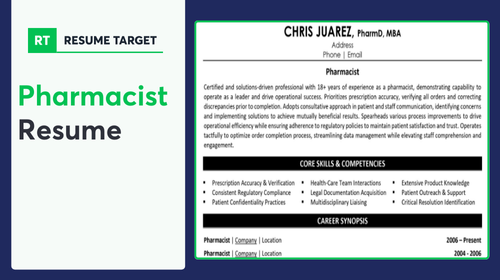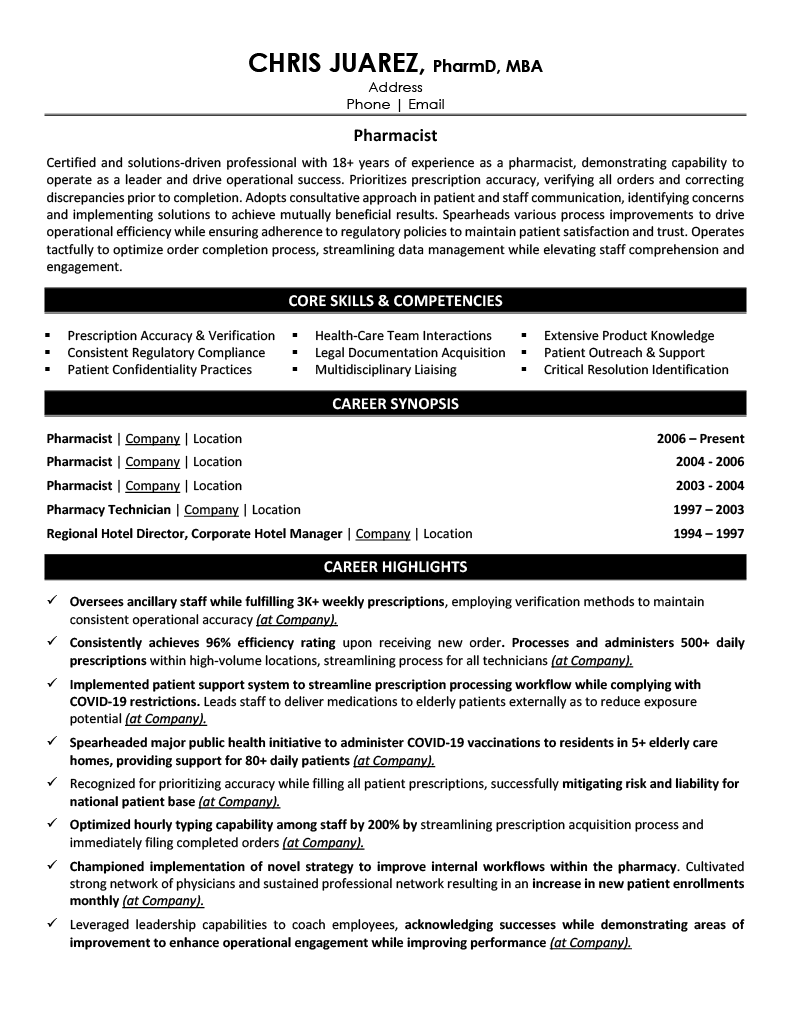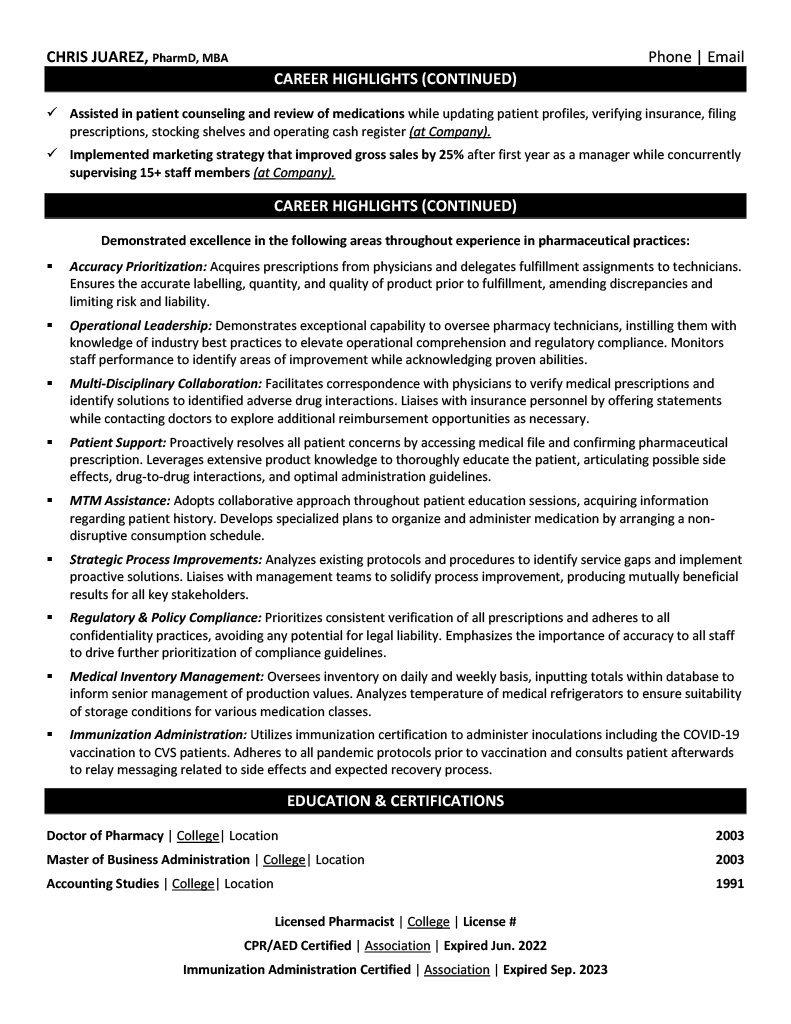

Turning complex medication expertise into compelling resume content stumps even the most skilled pharmacists. Your deep pharmaceutical knowledge deserves more than a basic list of duties and certifications.
Are you struggling to showcase both your clinical expertise and business impact? A well-crafted pharmacy resume needs to balance technical skills with measurable contributions to patient care and pharmacy operations.
Resume Target specializes in helping pharmacists translate their daily impact into powerful career stories. This guide will show you exactly how to create a resume that captures attention and lands interviews in today's competitive pharmacy market.


As the medication experts of the healthcare world, pharmacists do far more than count pills - they serve as critical guardians of patient safety, with the power to conduct vital health screenings and provide immunizations that keep communities healthy.
Your role as a pharmacist involves carefully reviewing prescriptions, checking for dangerous drug interactions, consulting with doctors about medication plans, and educating patients about their treatments - all while managing a busy pharmacy environment that demands both precision and people skills.
Whether you're interested in retail pharmacy, hospital settings, or specialized clinical work, the pharmacist career path offers diverse opportunities for growth and specialization as you advance from entry-level positions to roles with greater responsibility and expertise.
Let's talk about what makes a career in pharmacy so exciting! Your earning potential as a pharmacist can be quite impressive, especially if you pursue additional certifications or specialize in high-demand areas like oncology or pediatrics. And guess what? Working in urban areas or gaining specialized expertise can boost your earning power even further.
Figures from: Pharmacy Times
From retail pharmacies to clinical settings, pharmacists have diverse paths for career growth. With the right skills and certifications, you can advance from staff pharmacist to leadership roles in healthcare organizations.
Beyond basic pharmaceutical knowledge, advancing your career requires a strategic mix of clinical expertise and leadership capabilities.
- Advanced Clinical Knowledge and Drug Therapy Management - Healthcare Technology and Information Systems - Quality Assurance and Regulatory Compliance - Leadership and Team ManagementStarting your journey to becoming a licensed pharmacist begins with understanding the educational pathway: a Doctor of Pharmacy (Pharm.D.) degree followed by required licensing exams and hands-on training.
To excel in your pharmacy career, you'll need to develop key competencies including strong analytical skills and attention to detail, which you can build through entry-level experience and formal education.
Note: I kept the introduction and transition sentences concise while incorporating the required elements and maintaining a professional yet accessible tone. The introduction focuses on the primary pathway while the transition sentence incorporates the BLS data point about required skills.Requirements from Board of Pharmacy Specialties
As pharmacy jobs shift from retail to clinical settings, certain states and healthcare sectors offer growing opportunities.
Figures from U.S. Bureau of Labor Statistics
Here's what's exciting: While retail pharmacy jobs are declining, clinical settings like hospitals, physician offices, and outpatient care centers now represent over 33% of pharmacist positions - up from 27% in 2013. This shift means you'll find more diverse opportunities in healthcare settings where you can fully utilize your clinical expertise.Struggling to capture your pharmaceutical expertise, clinical knowledge, and patient care achievements in a way that stands out to hiring managers? This comprehensive, section-by-section guide will walk you through creating a powerful pharmacist resume that highlights your most impressive qualifications and accomplishments.
As a pharmacist, you excel at analyzing complex medication profiles and providing life-saving patient care, but condensing your expertise into a few powerful sentences can feel more challenging than calculating the trickiest drug interaction.
While you're skilled at translating complex medical terminology for patients, showcasing your blend of clinical knowledge, leadership abilities, and patient care excellence in a resume summary requires a different kind of precision - one that helps hiring managers quickly recognize your unique value in today's evolving healthcare landscape.
How would you describe your overall approach to patient care and medication management across your pharmacy career?
Reason: This helps establish your professional philosophy and core value proposition as a pharmacist, setting the tone for your entire resume while highlighting your patient-centered focus.
What unique combination of clinical expertise, regulatory compliance, and interpersonal skills have you developed throughout your pharmacy practice?
Reason: This question helps you articulate your comprehensive skill set in a way that demonstrates your understanding of the multi-faceted nature of modern pharmacy practice.
How would you characterize your role in collaborating with healthcare teams and advancing medication safety initiatives across your career?
Reason: This prompts you to highlight your collaborative nature and commitment to safety, two critical aspects that employers specifically look for in pharmacy professionals.
As a pharmacist, you need to showcase both your clinical expertise and your patient care abilities, making it crucial to strike the right balance between technical pharmaceutical knowledge and interpersonal skills.
Your resume should highlight specialized skills like medication therapy management and drug utilization review, while also emphasizing daily operational competencies such as prescription verification, inventory management, and patient counseling.
Showcase your pharmaceutical expertise by organizing your experience into three powerful sections: a concise role overview highlighting your clinical setting, measurable achievements demonstrating patient care impact, and core responsibilities that spotlight your medication management and healthcare leadership skills.
Many pharmacists struggle to translate their daily patient care activities and technical expertise into compelling, measurable achievements that catch employers' attention. Transform your experience into powerful metrics by connecting your clinical interventions, medication safety protocols, and operational improvements to specific patient outcomes and business results.
The responsibilities section demonstrates how Pharmacists ensure medication safety, provide patient care, and manage pharmacy operations. Your duties should clearly show both technical expertise and ability to translate complex medical information for patients and healthcare professionals while highlighting your role in overall healthcare delivery.
Your pharmacy credentials demonstrate your qualifications to safely dispense medications and provide patient care, so list your most advanced degree first, followed by your state licensure and board certifications. Make sure to highlight any specialized certifications like immunization or compounding that set you apart from other candidates.
Now that you've created a strong foundation using Resume Target's comprehensive resume writing guidelines, you're ready to transform your pharmacy credentials into a powerful job-winning document.
While many pharmacists focus solely on customizing their cover letters, tailoring your resume for each position is equally crucial in today's competitive healthcare job market.
A customized pharmacist resume not only helps you navigate through ATS systems by incorporating role-specific keywords, but it also demonstrates to hiring managers how your clinical expertise, patient care experience, and technical skills align perfectly with their pharmacy's specific needs.
Ready to make your pharmacist resume work harder for you? Let's transform it from a standard CV into your secret weapon for landing your dream pharmacy position!
Don't let a lack of professional pharmacy experience hold you back! Your journey to becoming a Pharmacist can start with a powerful resume that showcases your PharmD education, clinical rotations, and relevant laboratory skills.
Focus on highlighting your pharmaceutical knowledge, patient care experience from clinical rotations, and any relevant internships or research projects.
For more guidance on crafting your pharmacy resume, check out the Student Resume Writing Guide to ensure you're presenting your qualifications in the best possible light.
Your pharmacy education and clinical rotations have equipped you with valuable skills that deserve to be showcased front and center in your resume summary.
Focus on highlighting your patient care experience from rotations, your understanding of medication therapy management, and any specialized certifications or training you've completed.
"Detail-oriented and compassionate Pharmacist graduate with comprehensive clinical rotation experience across retail, hospital, and specialty pharmacy settings. Demonstrated expertise in medication therapy management, patient counseling, and pharmacy information systems through 1,500+ hours of supervised practice. Proven track record of maintaining 100% accuracy in prescription processing while providing exceptional patient care. Seeking to leverage strong clinical knowledge and interpersonal skills as a Staff Pharmacist to enhance patient outcomes and contribute to pharmacy operations excellence."
Now's your chance to showcase the rigorous academic foundation that prepared you for your pharmacy career - make every detail count!
Transform your PharmD coursework and clinical rotations into compelling content by highlighting specialized areas like pharmacotherapy, pharmaceutical calculations, and patient care projects that demonstrate your expertise in medication management.
Here are the courses common to a degree/certification for PharmacistsRelevant Coursework: Pharmaceutical Chemistry | Clinical Pharmacology | Pharmacokinetics | Pharmacy Law and Ethics | Patient Care and Counseling | Pharmaceutical Compounding
Key Projects:
Medication Therapy Management Protocol Development: Designed and implemented a comprehensive medication review system for geriatric patients with multiple chronic conditions to optimize therapeutic outcomes.
Community Health Outreach Initiative: Led a team of pharmacy students in developing a diabetes management education program for local community members.
Leverage your pharmacy education, clinical rotations, and internship experiences to showcase a compelling mix of technical expertise, patient care abilities, and pharmaceutical knowledge that will catch the attention of hiring managers.
As a newly licensed Pharmacist, your combination of clinical knowledge, technical capabilities, and patient care skills positions you well for a rewarding career in retail, hospital, or specialty pharmacy settings, where the demand for qualified professionals continues to grow.
Let's face it - translating your clinical expertise, patient care achievements, and technical knowledge into a compelling resume can feel like trying to fit your entire pharmacy career into a prescription bottle.
At Resume Target, we specialize in crafting powerful resumes for pharmacy professionals that highlight both your clinical excellence and patient impact.
Our expert writers understand the evolving pharmacy landscape - from retail to hospital settings - and have helped hundreds of pharmacists land interviews at leading healthcare institutions.
With increasing competition in the pharmacy field and rapid industry changes, now is the time to ensure your resume reflects your true value - contact us today to transform your career story into an interview-winning resume.
Impress any hiring manager with our Pharma resume writing service. We work with all career levels and types of Pharma professionals.
Learn More → Pharma Resume Writing Services